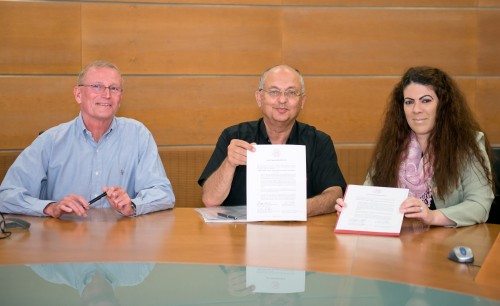Ben-Gurion University of the Negev and MIT signed this week a cooperation agreement between the researchers of the two academic institutions, the purpose of which is to promote joint nuclear research and mutual student exchanges.

Ben-Gurion University of the Negev and MIT signed this week a cooperation agreement between the researchers of the two academic institutions, the purpose of which is to promote joint nuclear research and mutual student exchanges.
The agreement for research cooperation is not the first cooperation between the two institutions: in 2005 joint student exchange programs began to operate, during which students from MIT came to study and intern in Israel.
This year saw significant growth in the joint activity, when over 77 students came to Israel for special internships. So far, about 300 students have arrived in Israel since the beginning of the pilot, in 2005.
The cooperation agreement is designed to support and strengthen the relationship between the faculties of the two institutions and this is another step in creating extensive and lasting relationships between the scientific communities.
"We, at Ben-Gurion University of the Negev, are excited and look forward to tightening our collaboration with the faculty and students of MIT. I am sure that the agreement signed today will enable more joint research, as well as student exchanges for a master's degree and additional funding from other sources for the benefit of both institutes", said the dean of the Faculty of Engineering Sciences at the university, Prof. Yossi Kost.
After a year of joint activity: Ben-Gurion University of the Negev and the University of Chicago are expanding their cooperation
The president of Ben-Gurion University of the Negev, Prof. Rivka Karmi, and the president of the University of Chicago, Prof. Robert Zimmer, decided these days to expand the cooperation between the two universities.
To mark one year of the mutual cooperation, Prof. Zimmer visited Be'er-Sheva, in order to observe closely the research activity there. The cooperation agreement was inaugurated in June last year in the presence of the President of the State of Israel, Mr. Shimon Peres, and the Mayor of Chicago, Ram Emanuel.
The two universities have begun to finance a series of ambitious research collaborations, which deal with the latest discoveries in nanotechnology and aim to produce new materials and processes that will help produce clean drinking water and make it more available and less expensive by the year 2020. Within the framework of the joint projects, innovative solutions at the water-energy interface are being researched, developing more efficient ways to use in water for energy production and for the treatment and supply of clean water.
These studies are led by Prof. Moshe Gottlieb from the Department of Chemical Engineering at Ben-Gurion University of the Negev and Prof. Matthew Tyrrell, director of the Pritzker Institute for Molecular Engineering at the University of Chicago. Ben-Gurion University of the Negev researchers from the Ilza Katz Institute for Nanoscale Science and Technology and the Zuckerberg Institute for Water Research teamed up with researchers from the Institute for Molecular Engineering. The University of Chicago is enlisting in these efforts two powerful research partners who have already committed to research in the field: the National Institute of Organisms in Belmont, Illinois, and the Marine Biology Laboratory in Woods Hole, Massachusetts.
The first wave of research proposals includes the creation of new materials designed to filter pollutants, bacteria, viruses and water from drinking water at a cost that is one-sixth that of current technologies; biological engineering that will help plants maximize their drought resistance mechanisms; and polymers capable of changing the water retention properties of the soil in agriculture.
